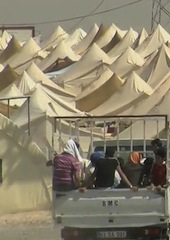Syrian Refugees: A Need for Global Burden Sharing
The world is on notice: We are facing a looming humanitarian crisis.
October 31, 2013

The continuing civil war and the grotesque violence by Syrian government forces as well as the rebels have heightened the world’s concerns about the future of Syria and its people.
While many Western nations expressed readiness for possible military involvement in the past, efforts to deal with the refugee crisis have been largely inadequate. The scope of the Syrian refugee crisis demands a change in policy and priorities.
Since the start of the conflict in 2011, two million Syrians registered as refugees with the United Nations High Commissioner for Refugees (UNHCR). Most live in overcrowded camps, or poor local communities in Turkey, Jordan, Lebanon, Iraq and Egypt. By the end of 2013, nearly half of Syria’s population will be displaced and in need of aid, according to the UNHCR.
Syrian refugees now make up one-quarter of the Lebanese population. They live in desperate conditions in poor communities, and compete for scarce jobs and resources with the local population. (And as Helen Ouyang wrote in The Globalist, the situation is significantly more desperate for the many Syrian refugees who are also rape survivors.)
Physically abused by the police and the public
Resentment of the refugees is on the rise. In Egypt, Syrian refugees are randomly jailed, and physically abused by the police and the public. Refugees face dire conditions also in Turkey and Jordan.
The hopelessness of the refugee life in these countries is forcing an increasing number of Syrians to use dangerous routes to escape to Europe. Greece, the closest EU state to the region, has been the natural choice for many.
Some 20,000 Syrians entered Greece through Turkey since 2011. More than 8,000 were, however, arrested upon arrival. Many stayed in overcrowded and filthy detention centers for months.
Greece routinely arrests Syrians that illegally enter its frontiers. Meanwhile, the Greek Coast Guard turns away boats they intercept in international waters near Greece, denying Syrian and other refugees the right to apply for asylum.
Asylum: Zero chance of acceptance
Those who succeed in entering the country and apply for asylum have practically zero chance of acceptance. Greek’s acceptance rate of all refugees has been less than 1% in recent years.
The refugees that manage to leave Greece for other European states risk being returned to the country following the Dublin II Agreement that assigns the first country of entry into the EU the responsibility of processing asylum seekers’ application.
Greece is becoming a new trap for Syrians escaping the civil war at home. Avoiding these predicaments, many are taking longer, but a more direct sea route to Italy. Some 7,500 Syrians arrived in Italy through the Mediterranean Sea since January. This seems to be only the beginning.
Only days before recent death of hundreds of desperate African migrants off the coast of Lampedusa, the Italian Coast Guard rescued a Tunisian boat heading to the Island with 398 Syrian refugees on board. The Lampedusa tragedy should be a warning shot about what potentially awaits many Syrian refugees.
We are facing a looming humanitarian crisis. An equitable system of global burden sharing can help minimize the scope of the crisis.
Although ending the conflict in Syria is the ultimate solution to the refugee problem, interim actions, including financial and physical burden sharing, by the United States and the EU can help provide temporary relief.
The current situation of the Syrian refugees in Jordan and Lebanon is not sustainable. Increased humanitarian aid is urgently needed according to the UNHCR.
Failing to deliver on promises
While committing a very small share of their GDP to Syrian humanitarian assistance, Britain, France and the United States have also failed to deliver on their promises. More than 75% of the commitment by the U.K, 56% by the U.S. and 44% by France remain unpaid.
Burden sharing in the form of money needs to be matched with larger quotas for refugees. On September 20th, Sweden announced giving citizenship to Syrian refugees. Hoping to take advantage of the policy, many rushed to Swedish embassies in Jordan, Egypt and Turkey — only to find out that the offer was for those already living in Sweden.
Traveling aboard unsafe boats to Italy through the Mediterranean Sea is now among the few options available to those who wish to proceed to Sweden and apply for citizenship. A number of such refugees died soon after leaving the port of Alexandria in Egypt on October 11th.
There has been other small burden sharing efforts in recent weeks. Joining UNHCR’s “Syria resettlement/ Humanitarian Admission Program effort,” the United States and 16 other countries recently agreed to set up special quota, 10,000 in total, for refugees fleeing the Syrian civil war.
500 Syrian refugees each?
France, Britain, Austria, Germany and most wealthy Western countries have agreed to accept 500 Syrian refugees each. Although this is a welcome move, it is far from sufficient.
The crisis calls for a substantially larger quota by the U.S. and the EU states. Meanwhile, a more equitable system of burden sharing is needed between the frontier states, Greece and Turkey, and other EU members.
On an ad hoc basis, France, Britain and a number of other states have been ignoring Dublin II in the case of asylum seekers arriving from Greece. A more systematic EU policy that exempts Syrians from Dublin II is fundamental to dealing with the crisis.
There are no perfect solutions to the deepening Syrian refugee crisis. These and similar options will provide temporary relief and ease the looming humanitarian crisis. They will save lives.
Takeaways
By the end of 2013, nearly half of Syria’s population will be displaced and in need of aid (UNHCR).
Syrian refugees now make up one-quarter of the Lebanese population. They live in desperate conditions.
Resentment of Syrian refugees is on the rise. In Egypt, they are randomly jailed and physically abused.
Greece is becoming a new trap for Syrians escaping the civil war at home.
The Lampedusa tragedy should be a warning shot about what potentially awaits many Syrian refugees.
Burden sharing in the form of money needs to be matched with larger quotas for refugees.
France, Britain and Germany have agreed to accept 500 Syrian refugees each -- far from sufficient.

